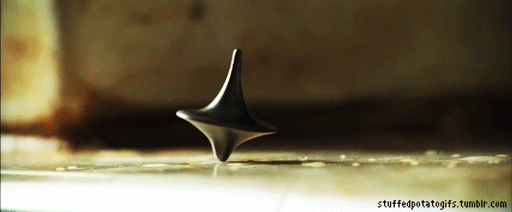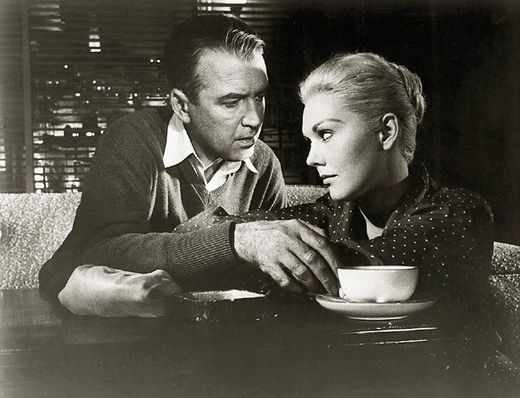Release Year: 1958
Director: Alfred Hitchcock
Cast: James Stewart, Kim Novak, Barbara Bel Geddes.
Plot: When he decides to retire due to his acrophobia, detective Scottie Fergursson receives a final job; an old friend asks for his help in order to save his enigmatic (and obsessed with her past) wife.
Review: I had great expectations set in this film, as it was the first Hitchchock work I would see and although it hasn't completely disappointed me, it does have some important flaws that prevent it from being the perfect psychological thriller I was waiting for.
But let's start with the positive points; Hitchcok really knows what he's doing and 'Vertigo''s atmosphere would make it a remarkable film even if it was pure rubbish. With a sensational score and a perfect use of the appropiate palette, the film looks and sound exactly as it should.
The second important aspect is the plot. The enigma that covers most of the film succeeds in intriguing the spectator and remains appealing until the end. The problem is that 'the end of the enigma' is not 'the end of the movie'. The truth is unfold too early (more than half an hour before the ending) and that spoils what could have been a powerful final impact, something that doesn't happen in the original novel. Why did Hitchcock have to change it?
The rest of the film becomes very strange and somehow creepy, as James Stewart character (unrecognizably changed since he did 'The Philadelphia Story') tries to transform Judy Barton into Madeleine Elster (who are indeed the same person) and they have one of the less credible love stories I've ever seen; Stewart (aged 50 when he did the movie) doubled Novak's age and when he kissed her I felt incredibly uncomfortable, as if something was wrong; in my mind the difference of age was too high and as the two actor didn't stick not even with glue, I had all the time the feeling that a father was kissing his daughter.
Anyway, as I've said before, the film has an inexplicable aura that together with its visual effects, helps to appeal the audience and make people forget that the casting decisions could had been much better.
But let's start with the positive points; Hitchcok really knows what he's doing and 'Vertigo''s atmosphere would make it a remarkable film even if it was pure rubbish. With a sensational score and a perfect use of the appropiate palette, the film looks and sound exactly as it should.
The second important aspect is the plot. The enigma that covers most of the film succeeds in intriguing the spectator and remains appealing until the end. The problem is that 'the end of the enigma' is not 'the end of the movie'. The truth is unfold too early (more than half an hour before the ending) and that spoils what could have been a powerful final impact, something that doesn't happen in the original novel. Why did Hitchcock have to change it?
A weird love story and an enigmatic plot in which Scottie's acrophobia plays an essential role are the main characteristics of Hitchcock's 'Vertigo'
The rest of the film becomes very strange and somehow creepy, as James Stewart character (unrecognizably changed since he did 'The Philadelphia Story') tries to transform Judy Barton into Madeleine Elster (who are indeed the same person) and they have one of the less credible love stories I've ever seen; Stewart (aged 50 when he did the movie) doubled Novak's age and when he kissed her I felt incredibly uncomfortable, as if something was wrong; in my mind the difference of age was too high and as the two actor didn't stick not even with glue, I had all the time the feeling that a father was kissing his daughter.
Anyway, as I've said before, the film has an inexplicable aura that together with its visual effects, helps to appeal the audience and make people forget that the casting decisions could had been much better.
The weird vistual effects used in the film create the strange feeling that you're being dragged into the protagonist's vertigo sensations
.jpg)
.jpg)




No hay comentarios:
Publicar un comentario